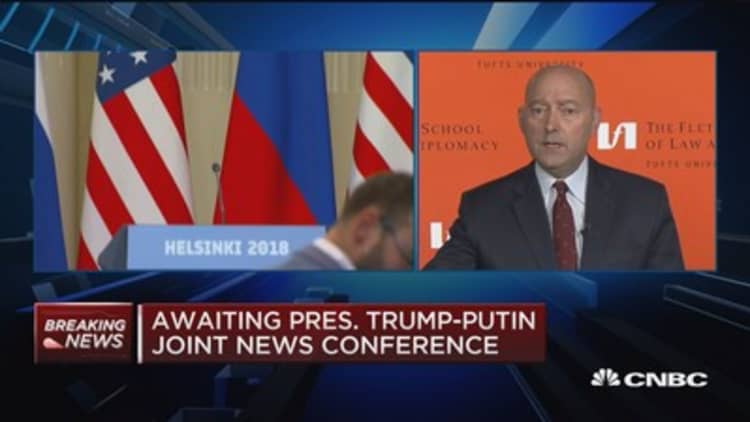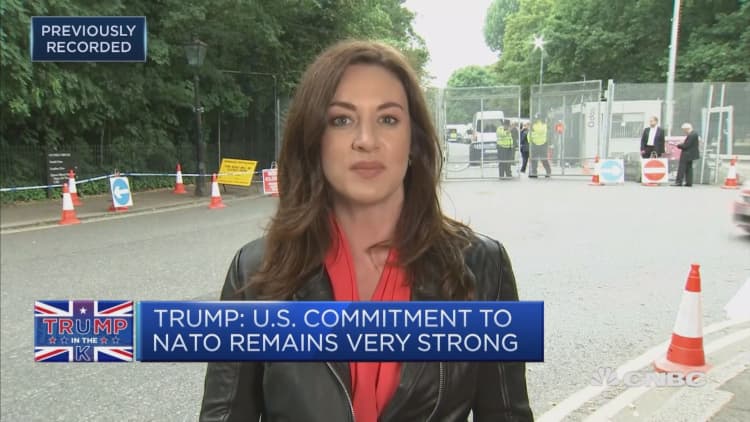After rattling U.S. allies last week at a NATO summit, President Donald Trump voiced concerns Tuesday that defending the "tiny" and "aggressive" nation of Montenegro could theoretically result in World War III.
Montenegro, located on the Adriatic Sea in southeastern Europe, joined the NATO alliance during the Trump administration. The nation, which borders Serbia, Albania, Bosnia and Croatia, is geographically smaller than Connecticut and has a smaller population than Washington, D.C. Russia has condemned its NATO membership.
The most recent addition to the alliance became a topic of discussion Tuesday during a Fox News interview with the president in the wake of his meeting with Russian President Vladimir Putin.
"Membership in NATO obligates the members to defend any other member that's attacked," Fox News host Tucker Carlson said to Trump. "So let’s say Montenegro, which joined last year, is attacked. Why should my son go to Montenegro to defend it from attack?"

Trump answered: "I understand what you're saying. I've asked the same question. Montenegro is a tiny country with very strong people. … They're very aggressive people. They may get aggressive, and, congratulations, you're in World War III."
In the same interview with Carlson, Trump continued to say he deserves sole credit for NATO members increasing defense spending. NATO last agreed to raise spending levels before he became president.
"Other presidents went [to NATO], and they would make a speech and then they would leave and nothing happened," Trump said, claiming that he increased NATO spending by $44 billion.
Earlier on Tuesday, the president wrote in a post on Twitter that NATO had "paid $33 billion more and will pay hundreds of billions of dollars more in the future, only because of me."
Trump, who has threatened to reduce U.S. military support if allies do not increase spending, pushed for the 28 other NATO members to do so ahead of the contentious meeting last week.
"NATO countries must pay MORE, the United States must pay LESS," Trump wrote in a July 10 tweet before boarding Marine One on the White House lawn.
Meanwhile, Ambassador Kay Bailey Hutchison, the permanent U.S. representative to NATO, told reporters during a White House briefing earlier this month that 16 nations are on track to meet spending standards. Hutchison said that "100 percent" of U.S. allies were increasing their spending, calling it "the biggest increase in defense spending by our allies since the Cold War."
It's not clear that any NATO members have agreed to boost their spending because of Trump. In 2014, members of the alliance committed to spend 2 percent of their gross domestic product on defense within a decade. Trump asserted last week that some members had agreed to raising their spending levels to 4 percent, though that claim was immediately rejected by French President Emmanuel Macron.
An attack against one is an attack against all
Despite his rhetoric on defense spending, the president signed onto an agreement at the NATO summit that reiterated the mutual defense language included in Article 5 of NATO's founding document.
The agreement the president signed last week notes that any "attack against one Ally will be regarded as an attack against us all."
Article 5 is the bedrock principle of NATO and the reason it is widely considered the most powerful military alliance in the world. The last time NATO invoked Article 5 was after the Sept. 11 terrorist attacks on the United States.
Montenegro's prime minister was asked about Trump's interview Wednesday in parliament.
"He said that the Montenegrin people are brave and that he does not want the U.S. citizens to fight for others and for other NATO member states," Prime Minister Duško Marković said, according to an official translation provided to NBC News. "He did not say that only on that occasion, but he also said the same at the NATO summit, you know it because he said it publicly, not in terms of justification of NATO's existence, but of NATO funding."
According to NBC News, citing official figures, Montenegro contributes more troops per capita to the war in Afghanistan than the United States. Overall, Montenegro maintains a standing military of less than 2,000.
Montenegro joined NATO last year with the overwhelming consent of the U.S. Senate, which voted 97-2. Trump himself signed off on the country's entrance into the alliance.
The president's comments came just a day after his summit with Putin and raised concerns among some critics that the president is being too deferential to the Russian leader. Russia has historically opposed NATO's expansion — the alliance was formed to defend against the Soviet Union in the early days of the Cold War.
In 2015, a representative for Putin said that admitting Montenegro into the alliance would result in "retaliatory actions." After Montenegro acceded into NATO in 2017, the Russian foreign ministry issued a statement condemning the decision.
WATCH: Trump's comments on NATO




